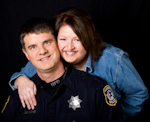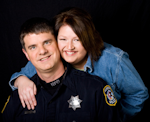I handled an interesting domestic last week. The (very) short version: A young wife came to the department with her father to report being beaten by her husband of five years, and that he had been physically abusive several times a week for the last three months. They had met four years before marrying so, after nine years knowing her husband, she was shocked at his explosive violence and capacity for emotional abuse. Maybe she shouldn’t have been; despite all their years “together” they’d really only lived together for three months during their entire marriage – when she went to visit him in his native India – before he moved to the United States to be with her and go to graduate school. Although she insisted theirs’ was a “love marriage” it struck me how naïve to think it possible to really know someone you may truly love but have barely laid eyes on even after nearly a decade together.
A lot of “red flags” were surely missed across the thousands of miles between Chicago and India. It’s a good thing we here take time to know one another, vet behavior and character, and go into our relationships clear-eyed and informed. Right?
Actually, too often we don’t. We miss the red flags that should warn us off bad couplings and ill-advised marriages all the time. Even cops – we steely-eyed observers of human nature – too often get sucked into someone’s wake of dysfunction. Maybe young police officers are particularly susceptible; combine a personality made for rescuing and protecting, high visibility (and attractiveness) to certain types of potential partners, and a career that is notoriously challenging to even stable relationships, and trouble can ensue.
As a counselor, Althea spends a lot of time working with married and committed long-term couples, individuals struggling with issues in their relationships, and people who have histories of troubled and failed relationships but are trying to do better. More than a few of these clients have been cops. After years of hearing their stories she has compiled an impressive list of red flags that should have been heeded in the past, and that she teaches her clients to be wary of going forward. Of course, there are certainly many more that could be included, getting into both behavioral minutia that might be deal breakers for just some, and the glaring abuse that should alarm anyone, but what follow are the more subtle clues that are often missed. Althea’s top Red Flags to watch for in your prospective partners are:
Chronic negativity about, or disdain for, other people
Listen to how they talk about other people. Do they speak often of the idiots and incompetents in their personal and professional lives, whose messes they have to constantly clean up and inferior intellects repeatedly frustrate your date’s best efforts? In the stories they tell, are they invariably the hero who fixes everyone else’s screw-ups and whose rapier wit lets the lesser life forms know who’s really in charge?
And how do they treat others? The classic question of “how does s/he treat someone of lesser status, in a position of servitude, or who cannot do anything for her/him?” is perhaps one of the best markers of character when judging a potential romantic partner. Someone dismissive or disdainful of someone they perceive as lower status is hardly a promising mate; it’s generally reflecting some pretty weak self-esteem when you peel back the layers, and how long before it gets turned on you? When will you become the idiot they complain about to others?
Besides, do you really want to be closely associated with someone who torments the server about to handle both your entrees? Just something to think about, from someone who used to work in restaurants…
Always the victim
Is your date always the victim of circumstances (at best) or outright skullduggery (at worst) in their failures, lost opportunities, or current less-than-ideal situation? Sometimes bad luck and/or nefarious shenanigans are responsible for circumstances, and sharing the pain can be therapeutic. But when it reaches “if it weren’t for bad luck I’d have no luck at all” proportions, or they seem to be surrounded by more varied and colorful villains than Batman at the annual Gotham City Goons Convention, maybe claims of victimhood should be viewed a little skeptically.
Commiserating, and seeking commiseration, can be very bonding. It can also become more than a little exhausting when victimhood becomes the norm. A lot of us seek out victims to rescue, even if unconsciously. For all the short-term gratification and ego boost they provide, they make for poor long-term relationships because the victimhood never ends.
Past relationship failures are invariably their exes fault
Almost everyone has failed relationships in their past. Sure, there really are those couples who met in 6th Grade, stuck together through high school and college, married, raised their perfect little family, and are adorably going into their golden years together (barf… right?). And then there are the rest of us.
Look, most dating relationships end, for various reasons ranging from one or both “simply not feeling it” to serious problems creating an irreconcilable rift. Most of us don’t start with stellar dating skills but have to develop them over time, and largely by trial-and-error, before we get it right. Relationships will crash and burn in the process.
If you’re dating someone with a history of failed relationships, with every single failure blamed on the faults of their ex, it’s likely you aren’t hooked up with the perfect romantic partner who has yet to meet their perfect match. No, you’re probably hooked up with crazy. When this one goes sideways you are going to be blamed to the next poor sucker. If they cannot own their own failures, any of yours are going to be highlighted.
There are distinct patterns to their breakups
How do they describe the endings of the relationships that came before you? If you detect a pattern of poor choices on their part, similarities in the reasons they grew apart from their exes, or seemingly petty reasons for ending them, it’s a pretty good bet you’re looking at how or why you’ll later break up. Maybe not, and maybe you are better than all the others, but just beware of the patterns that have come before you.
They are a serial dater
Can they be alone or, once one relationship ends, is another sure to follow in short order? Do new relationships even overlap the demise of the last? Serial daters – people who seem to never be without a boyfriend/girlfriend for even a brief time – tend to be bad bets; this is much less a sign of irresistible popularity and more so signifies insecurity or a serious lack of discernment of the “anyone – even the wrong person – is better than being alone” variety.
This isn’t to say dating a lot, or being open to getting to know a lot of people is bad or undesirable. What becomes concerning is rushing into seriousness over and over, reaching levels of emotional intimacy with too many people, too fast. The insecurity that leads to this almost always tears the relationship apart later.
They move too fast
That is to say, they move to a level of commitment, emotional intimacy, and even proclaiming “love” way too rapidly. The desire to define and “nail down” the relationship – what Althea sometimes describes as “Saying ‘I love you’ before you’re even comfortable farting in front of one another” – leads to thinking you really know each other when so much important stuff is still hidden.
Sexual chemistry is very often mistaken for emotional compatibility. Being able to distinguish between the two is critical and recognizing when the one you are dating has made that mistake (or is prone to making it) is important. Far more important is learning, knowing, and being compatible with each other’s values, interests, and aspirations. Physical attraction is innately driven and will draw you to far more people than you are actually compatible with on an emotional and intellectual level so, after the initial spark brings you together, focus on going deeper to separate the merely cute from the truly compatible.
They cannot relax
Being unable to sit still, be in the present, and relax is easily mistaken for drive or ambition. It can also be fun, being with someone who is always looking for the next adventure, and sweep you up in their momentum. But often this restlessness is really a sign of serious anxiety. In time it becomes exhausting or unpleasant, and you’ll either become a further source of anxiety or a bulwark against it, both unpleasant places to find yourself.
They have a history of serious character issues
Cheaters cheat, criminals repeat, and a history of questionable acts and personal associations should serve as possibly the biggest red flag for a cop. While the other red flags might signal threats to your happiness, getting entangled with one of these people threatens your very livelihood and possibly freedom.
This should go without saying, but over and over you will hear about – or even witness – cops who risk it all over someone they would normally run a criminal history check on if they ran across them on the street. These are the easiest red flags to see. Why, then, do so many of us ignore them?
Thinking about them is not romantic, especially in the early days of dating someone new, but awareness of relationship “red flags” is critical to your personal and professional well-being. Go slow, keep your eyes open, and be safe even in your personal life.

Michael Wasilewski
Althea Olson, LCSW and Mike Wasilewski, MSW have been married since 1994. Mike works full-time as a police officer for a large suburban Chicago agency while Althea is a social worker in private practice in Joliet & Naperville, IL. They have been popular contributors of Officer.com since 2007 writing on a wide range of topics to include officer wellness, relationships, mental health, morale, and ethics. Their writing led to them developing More Than A Cop, and traveling the country as trainers teaching “survival skills off the street.” They can be contacted at [email protected] and can be followed on Facebook or Twitter at More Than A Cop, or check out their website www.MoreThanACop.com.

Althea Olson
Althea Olson, LCSW and Mike Wasilewski, MSW have been married since 1994. Mike works full-time as a police officer for a large suburban Chicago agency while Althea is a social worker in private practice in Joliet & Naperville, IL. They have been popular contributors of Officer.com since 2007 writing on a wide range of topics to include officer wellness, relationships, mental health, morale, and ethics. Their writing led to them developing More Than A Cop, and traveling the country as trainers teaching “survival skills off the street.” They can be contacted at [email protected] and can be followed on Facebook or Twitter at More Than A Cop, or check out their website www.MoreThanACop.com.


